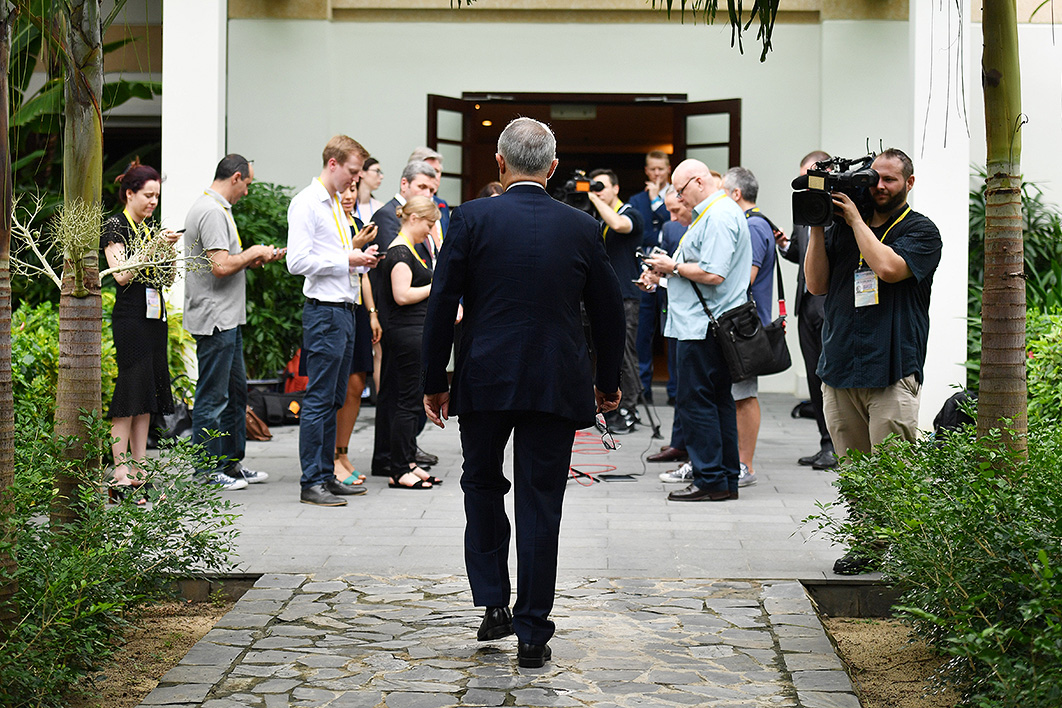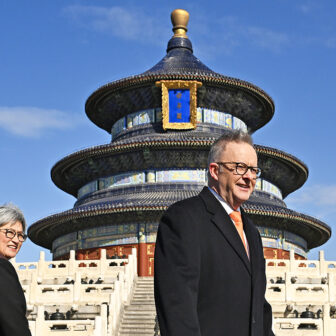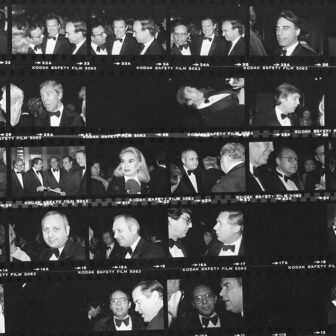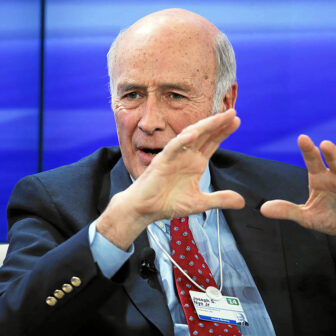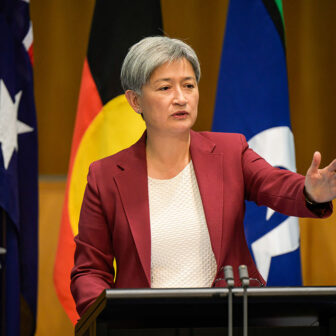Launching Australia’s international radio service in December 1939, prime minister Robert Menzies declared, “The time has come to speak for ourselves.” The second world war awoke Australia to the need for a distinctive international voice, in broadcasting as well as diplomacy.
Quoting Menzies at a Liberal government is always a good tactic, so here’s more from the founding father, from April 1939:
I have become convinced that, in the Pacific, Australia must regard herself as a principal, providing herself with her own information and maintaining her own diplomatic contacts with foreign powers… It is true that we are not a numerous people, but we have our vigour, intelligence and resource, and I see no reason why we should not play not only an adult, but an effective part in the affairs of the Pacific.
Menzies offers an enduring truth while stating the bleeding obvious. Over the decades since then, though, Australia has ceased using media power to play an intelligent and effective part in the affairs of our region. As one former senior ABC staffer puts it, our programming for regional audiences is simply “risible.”
To be clear, “broadcasting” is a catch-all covering a lot of ground: analogue to digital to satellite, Facebook to FM. Content converges: radio and TV become video and audio and text. Broadcasting is publishing. TV and radio are reborn online. The digital age both unites and atomises.
When the Abbott government axed the ABC’s ten-year $220 million contract to run Asia-Pacific TV in 2014, just a year after it began, a communications minister named Malcolm Turnbull argued that there was no need for the Oz voice in a crowded regional arena. If people wanted international stuff, Turnbull said, they could go to the BBC or CNN.
The ghost of Menzies would have raised both eyebrows, because Menzies said the purpose of getting close to great and powerful friends was to bolster our interests, not hand ’em over — insurance policy, not giving away the store. During his three years as prime minister, the same Malcolm Turnbull came round to the “speak for ourselves” viewpoint.
In a key foreign policy speech last year, he reflected on the digital revolution:
Technology has connected local aspirations and grievances with global movements.
Hyper-connectivity has amplified the reach and power of non-state actors, forcing us to reassess how we, as nation states, assert and defend our sovereign interest…
Now, in this brave new world we cannot rely on great powers to safeguard our interests. We have to take responsibility for our own security and prosperity while recognising we are stronger when sharing the burden of collective leadership with trusted partners and friends.
The gathering clouds of uncertainty and instability are signals for all of us to play more active roles in protecting and shaping the future of this region.
Take responsibility. Don’t expect the great powers to safeguard our interests. Act to shape the future of the region. Menzies would nod at this description of the value of a powerful Australian voice — and the need to speak for ourselves.
And yet, these are the worst of days for Australian international TV, which is twenty-five years old this year. And they are the hardest days for Radio Australia, which reaches its eightieth birthday next year. They are gasping, limping shadows. The cash drips slowly; much life has departed.
In 2010, the ABC spent $36 million on international services (about $42 million in today’s dollars). These days, a guesstimate of the international broadcasting spend is $11 million. The ABC is vague about the exact figure; perhaps it’s an embarrassed reticence. Yet tough international times demand independent journalism, just as they require steady political attention, economic engagement of every kind, smart diplomacy, good aid, effective intelligence and a strong defence strategy.
To remake Australia’s international media thinking, the government and the ABC will have to separate domestic bickering from foreign policy. The government can overturn poor decisions that have damaged our international voice if it wants to, and the ABC has the capacity to recover its role as an international broadcaster, a core charter responsibility that Aunty has been shedding.
Surveying international broadcasting’s decline means picking through the ruins of past decisions by government and the ABC. The debris still remains from the Abbott government’s decision to axe the ABC’s ten-year $220 million contract to run Asia-Pacific TV just a year after it began. That was a sad example of Australia’s international interests being trampled by domestic argy-bargy driven by deeply entrenched hang-ups about the ABC. The Liberal Party’s fear of the ABC was succinctly expressed long ago by John Howard’s consigliore Graham Morris: “The ABC is our enemy talking to our friends.”
The enemy–friends tension is a backhanded tribute to the ABC’s influence across Australian society. For many decades, ABC power also reached beyond our borders; domestic political arguments have obscured the ABC’s traditional role as a major media voice in our neighbourhood. It discarded its South Pacific audience by reducing electricity to its shortwave broadcast towers, degrading the signal and cutting off listeners, and then announced there was no longer a shortwave audience. The broadcaster decided what it was prepared to give, not what the South Pacific required.
A broadcasting recovery involves listening to what the Islands say they need, rather than telling them what they’ll get. Reviving South Pacific shortwave should be part of a bigger project: to restore the ABC as an international broadcaster and create a twenty-first-century Australian voice across the Asia-Pacific.
For its part, Canberra stopped thinking about what good journalism could do for the region, and for Australia’s vital interests. The fashionable chatter was all about new technology and soft power, losing sight of deep truths about the role of journalism. Soft power trumped hard news.
Discarding our journalistic heritage in our region is poor history, lousy policy and appalling judgement — and it meant that lots of old media agendas became fresh headaches for Australia. Propaganda and polluted facts are back, rebadged as fake news. Canberra laments challenges to the rules-based system in a tone tinged with a bewildered sense that things shouldn’t be like this. A media rethink can start with putting in the journalistic vision so lacking in last year’s foreign policy white paper.
The paper was happy to talk about “media” (fourteen instances) but didn’t once mention “journalism” or “broadcasting.” This was strange, given that the final chapter, “Partnerships and Soft Power,” stressed the “vital” need for persuasive Australian soft power to influence the behaviour or thinking of others. The closest reference to journos was a domestic tick for Australia’s “robust independent media.”
“Global governance is becoming harder,” the white paper judged, and the international order is contested by “measures short of war,” including “economic coercion, cyber attacks, misinformation and media manipulation.” The paper fretted that Australia must be ready to “dispel misconceptions and ensure our voice is heard when new and traditional media are used to sow misinformation or misrepresent Australian policies.”
The “ensure our voice is heard” line was where I expected to find journalism. Instead, the answer to the “voice” conundrum was lots of soft power and digital engagement — a reasonable start, not a full answer. Australia needs to rediscover the power of hard news as the sharp edge of our soft power.
For twenty-five years, Australia’s international TV voice has been a political plaything and a broadcasting afterthought, constantly facing chops and changes. This history of chop, change and political spasm is evident in the eight changes of identity and ownership over that quarter-decade:
1. First came Australia Television, or ATV, in 1993, when the Keating Labor government gave the ABC start-up funding. Unlike the rest of the ABC, though, ATV carried commercials. Canberra wanted it, but didn’t want to pay for it.
2. Channel 7 was given control in 1998 (twice — once with news, then as a pure shopping channel). The commercial network made a hash of it, didn’t make any money and lost interest. So…
3. In 2001, it went back to the ABC as ABC Television International.
4. A year later, it was rebranded as ABC Asia Pacific.
5. Then, in 2006, came another name change: the Australia Network.
6. In the 2014 budget, the Coalition cut all funding to the Australia Network. It closed, to be replaced by a drastically cutdown operation.
7. The Australia Network’s replacement, Australia Plus, started in September 2014.
8. From 1 July 2018, the network has been renamed ABC Australia.
Neither side of politics emerges with much credit from this zigzag. Canberra’s level of interest has been as changeable as the name.
The moment of creation under Labor illustrates recurring themes of limited attention, political crosscurrents, and plenty of vision but little money. Launching ATV to broadcast to the Asia-Pacific, the Keating government boasted of its significance for regional engagement and interests, ranging from media and education to business and foreign policy. Confident talk wasn’t matched by cash or commitment.
The ABC sought to establish an international version of its domestic service, but couldn’t devote proper resources to ATV, not least because the government didn’t want to pay for what Australia needed. Programming suffered because the ABC had domestic copyright to broadcast programs but didn’t own international rights. The Keating government knew ATV was worthwhile, but wouldn’t give anything more than start-up funding for the satellite service. Once established, it would have to pay its own way with advertising.
The refusal to launch ATV as a fully funded public broadcasting service (like the rest of the ABC) was telling. A hybrid design — part ABC, part commercial — was the half-arsed response of a half-hearted government. That half-in, half-out problem continued.
Domestic politics too often derails discussion of international TV. The Keating cabinet’s debates about establishing ATV veered off into rant-and-rave sessions about how ABC domestic reporting was hurting the government. Much bile was directed at ABC managing director David Hill, who’d fought budget cuts with a famous campaign proclaiming the ABC cost each Australian only “eight cents a day.”
A couple of times when ATV was on the cabinet agenda, Hill came to Canberra to support the idea. Having the ebullient ABC head in the cabinet anteroom was a disastrous provocation. After navigating past Hill, ministers would have another ABC hate session, then defer decision.
Themes from the creation story recur over the twenty-five years:
Politics overturns policy: Each change of federal government — Keating to Howard to Rudd to Abbott — has been a chop-change moment for international TV. The Liberal–Labor foreign policy consensus has never translated into agreement on the worth of our broadcasting service to the regions. (Southeast Asia and the South Pacific are different regions with different audiences.) Thus…
The gap between big interests and little cash: The high rhetoric of Asia-Pacific engagement is negated by low commitment of dollars.
The ABC as problem and solution: All federal governments come to fear/distrust/hate ABC reporting on them; that perennial rant-and-rave problem obscures a clear understanding of what public broadcasting can do for Australia in the Asia-Pacific. The problem has a funny dimension: politicians know the power of the ABC, but they’re not willing to use that power to serve our international interests.
International ABC can’t be domestic ABC: The ABC’s domestic programming is vital to the international service, but that’s the start, not the finish. Reaching and holding audiences in Asia and the South Pacific is about talking with, not just talking to. Diverse audiences have different needs. Programming has to be for them, not just rebroadcast from Oz.
Chop and change hurts: International broadcasting is expensive and complex because a lot of power is in play. Australia’s constant and growing interests in the Asia-Pacific demand a constant and growing broadcast conversation, using all converging media.
A strong, consistent voice in our region serves Australian foreign policy. Get the zigzag pattern off the screen and adjust the international TV picture.
The wrack and roil afflicting the international system matches the digital disruption of news media. The rules and norms of the foreign policy game and media world shake, shift and suffer.
Australia frets about threats to the rules-based system as the tectonic plates of geopolitics and geoeconomics crunch. Not least of those truths is the one to be found at the heart of seven Australian defence white papers over forty years: geography matters.
Traditionally, Australia wanted a strong international broadcasting voice in what defence-speak calls our region of primary strategic interest: Southeast Asia, the South Pacific and the eastern Indian Ocean. That broadcasting tradition is looking very modern. Geography is back. Or, more accurately, the demands of geography never went away — we’re just feeling the weight with fresh force.
In the foreign policy game, the word “influence” stands besides “interests” at the calculating, cerebral end of the field. But influence and interests must always be within shouting distance of values and beliefs, which tend to reside in the heart and hearth part of the arena.
The qualities of good journalism — “reliable,” “independent,” “factual” — are exactly the same as are needed in the foreign policy of a country seeking to persuade others, protect interests, project influence and promote values.
Amid all the disruption, there’s a perfect media instrument ready to serve as Australia’s voice in the Asia-Pacific, to do journalism that’ll serve our interests and values. Well-tested by history, with a proud heritage of great journalism and a prescient charter, that instrument is the Australian Broadcasting Corporation. Simple as ABC, really.
Or it should be. To illustrate the ABC problem, come into my anecdotage while I recall a previous life as an ABC correspondent. Two decades ago, a sardonic line rattled around ABC executive ranks: “A peasant in Longreach is more important than a peasant in Lombok.” The bitter point of the comparison — central Queensland versus an Indonesian island — was that the ABC must devote scarce cash to its domestic users, not its potential international audience. Axing South Pacific shortwave last year affirmed that old corporate view.
But power politics zoom back, the digital revolution rages and Australia’s foreign policy dilemmas demand that the ABC get back into the international journalism game, bigger and better.
Three distinct decision strands must combine for the back-bigger-and-better conclusion to be realised. Strands one and two reside in Canberra: first, political and policy consensus; second, the shift from agreement to action.
Canberra’s troubled consensus: In international affairs, tectonic plates are crunching and lava is melting the rules-based system. Canberra’s agreement on how nasty things are looking is expressed in the 2016 defence white paper, the 2017 intelligence review and the 2017 foreign policy white paper.
The defence white paper frets about fraying international rules: the word “rules” is used sixty-four times — forty-eight of these in the formulation “rules-based global order.” The stress on rules expresses the fear of what’s failing. “Rules-based global order” is a big phrase to cover such disparate forces as jihadism and China’s rise. Mostly, though, it’s about China.
The intelligence review identified three big trends: fundamental changes in the international system, extremism with global reach, and accelerating technological change. And the foreign policy paper got a lot into one stark sentence: “Today, China is challenging America’s position.”
The Canberra consensus fuels the substantial Liberal–Labor unity ticket on foreign policy. The ticket is tacit but important. As always, argument rages about whether the government or opposition will do a better job on China or the US alliance or in the South Pacific. What’s not disputed is the trouble in the trends. Beneath the usual politics, there’s a shared sense of foreboding.
From description to prescription: It’s always tough moving from anxiety to action. What can/should/must we do?
A strong broadcast voice in the Asia-Pacific, based on the ABC, is part of the answer to regional challenges. Australia must move from the agreed description of problems in strand one to a new Canberra consensus on the use of the ABC to support our interests, influence and values in the South Pacific, Southeast Asia and beyond.
We must rebuild a powerful and consistent broadcasting voice so we can rejoin regional conversations and contests. Tough international times demand independent journalism, just as they require steady political attention, economic engagement of every kind, smart diplomacy, good aid, effective intelligence and a strong defence strategy.
Canberra has to agree on the prescription, set the policy response and do the budget numbers for a sustained media commitment.
ABC changes: Recent decades show that the ABC will always choose Longreach. ABC priorities are domestic, not international. The institutional response is logical, yet it fails to serve Australia beyond our shores. We need a future ABC that can do what Australia needs for Lombok and Lautoka and Lae.
The domestic–international tensions inherent in the ABC charter must be resolved. The international responsibility must be more than a declining division of the ABC — it must become a new planet in the Australian policy universe. That planet must be created by the ABC and draw on its values and resources.
To serve Australia’s interests, influence and values in the Asia-Pacific, we need an Australian International Broadcasting Corporation, or AIBC. The AIBC would resolve the domestic–international tensions in the ABC charter, giving proper expression to the charter’s international dimension.
The charter is at the heart of the 1983 Act that remade the ABC from a Commission to a Corporation. In the charter’s foundational clause, the law gives equal weight to the ABC’s domestic and international responsibilities.
Domestically, the ABC must produce innovative and comprehensive broadcasting services of a high standard — programs that contribute to a sense of national identity and inform and entertain, and reflect the cultural diversity of the Australian community, with a specific mention of “programs of an educational nature.”
Internationally, it must transmit news, current affairs, entertainment and cultural programs that will “encourage awareness of Australia and an international understanding of Australian attitudes on world affairs; and enable Australian citizens living or travelling outside Australia to obtain information about Australian affairs and Australian attitudes on world affairs.”
The habit of rebroadcasting domestic fare has been maintained in the relaunch of the Asia-Pacific TV service, rebranded as ABC Australia. The ABC says the service “will deliver distinctive content to culturally and linguistically diverse international audiences and to Australian expatriates, encouraging international awareness and understanding of Australia and Australian attitudes.” Fine words, but the ABC’s reach falls short of its grasp.
The programming offers rebroadcasts of ABC news programs, “slice of home” shows and Australian Rules football. For an expat, an excellent menu. But for forty countries of the Asia-Pacific — those “culturally and linguistically diverse international audiences” — this is lots of Oz attitudes, about Oz for Oz.
Australian content is necessary but not sufficient for an Asia-Pacific service. Australian content needs to be the start, whereas at the moment it’s the finish.
To do more will need cash and commitment from Canberra — and the AIBC to deliver the focus. The aim is to talk with neighbours, not merely broadcast to neighbours; that supposes media conversation of many types, not just an oration from Oz.
Atop the excellent foundation of good ABC shows, the AIBC must offer reporting that matters in the lives of Lombok or Lautoka or Lae. The new organisation should be born of the ABC, reflect ABC traditions and standards, and draw on ABC resources — but it must have its own corporate identity as an expression of its distinct, international purpose.
The AIBC would have its own chair and board and its own separate budget. The deputy chair of the ABC and the ABC managing director should be on the board of the AIBC, but so should the head of the Special Broadcasting Corporation.
Replicating the successful ABC model, the board should have a staff-elected member, and then gather board members with international experience from business, diplomacy, aid and one of the major generators of Oz soft power in the years ahead, the universities.
Under its Act, the ABC can establish subsidiary companies, so in theory no new legislation is required. But in line with my argument that Canberra must pay for what Canberra wants, the AIBC must have its own budget allocation. Don’t leave it to the ABC. Aunty can’t pay for what Australian foreign policy demands.
The AIBC must have a separate identity so the international effort doesn’t get drawn into the domestic fights that are a natural part of the ABC’s existence. Like the ABC, it must be a fully funded, independent public broadcaster — not a state broadcaster.
Give the AIBC the right to seek partners where it sees a natural fit in such realms as development aid, philanthropy and universities. Its core, though, is as a public broadcaster.
Don’t fall into the trap of thinking Australia can have an important foreign policy instrument on the cheap. If the AIBC is going to have heft, it must be richly funded by Canberra; the ABC doesn’t have a lazy $30 million to redirect to Oz foreign policy, much less $50 million or $75 million.
Canberra has to see the need and fund the instrument. Australian interests, influence and values demand an Australian voice in the Asia-Pacific. •
